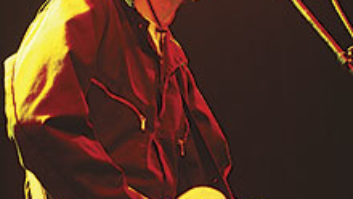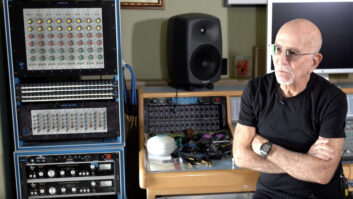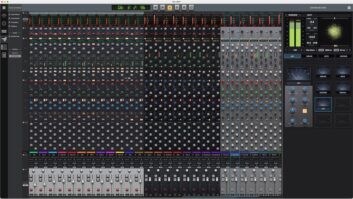The Eels’ music is, shall we say, a little different from the mainstream. It definitely rocks, awakens the senses and can be hip hoppy, edgy and even poetically profound. Case in point, the impact of three separate deaths in multi-instrumentalist/singer E’s (aka, Mark Oliver Everett) family — his father’s (Everett was 19), his sister’s suicide and his mother’s death from lung cancer. It goes places most rockers don’t go and covers subjects few attempt. On the group’s fourth and latest CD, Souljacker, there’s a song about being a dog-faced boy and another about having your soul stolen. However, Everett and The Eels aren’t out to shock or outrage like Marilyn Manson or Eminem. Rather, the reclusive artist is expressing his off-kilter perceptions in a somewhat modern rock framework.
In the early ’90s, Everett, working under the E moniker, put out two promising, mostly solo, recordings on Polydor that he describes today as “constantly evolving.” His single “Hello Cruel World” became a Top 10 alternative rock hit and created a bit of a buzz. By 1995, he had moved on to DreamWorks and added other bandmembers; together, they became The Eels. That move, along with the adaptation of some trip-hop textures, marked a major transition for the Virginia native, leading to even more airplay on alternative radio stations, extensive tours and several MTV “Video Music Awards” trophies.
With the help of his mainstay sideman — drummer Jonathan “Butch” Norton — and a cast of rotating players, Everett started crafting more stream-of-consciousness-type songs, anywhere from uplifting Beatles-like melodies to morbid, gothic-styled subterranean downers. To make things even more interesting, he’d often write on different instruments, such as organ instead of guitar, and he began using unusual combinations of instruments on his albums, similar to a latter-day Brian Wilson.
In fact, Everett thinks of his band’s working relationship as being similar to that of Brian Wilson and the Beach Boys’. “On their records,” he says, “it was Brian Wilson and anything goes, with an endlessly shifting cast of characters. Then on tour, it was this band, the Beach Boys. And then it got to the point where [Brian] wouldn’t even go on the tours. That’s my goal: to stay home and find a replacement to go instead. I need my Glen Campbell,” he says.
He’s only partly kidding. Everett says touring is fun, but he’s happiest when working at home in the Los Feliz area of Los Angeles. His studio boasts a Mackie board, a selection of Neve preamp modules, Manley compressors, a Distressor, an assortment of high-quality microphones and a Pro Tools rig. It’s no exaggeration to say that he lives and breathes music. “My biggest problem is not having enough time to put out all the different records I’d like to do,” he laments. “I’ve already finished the next two albums; actually, three or four [including his side project MC Honky].”
In an era when most artists are pressured to record more releases — to get “product” in stores — Everett was told to slow down and chill for a while. But he can’t. If he isn’t on tour, then he’s working on songs to prepare for release. Souljacker was actually done when his previous CD, Daisies of the Galaxy, came out two years ago. He even considered a double release at the time, but decided that they were very different projects — even though all the songs were written and recorded around the same time.
The eclectic musician tends to live in his own world and doesn’t pay much attention to trends or styles; that, in part, may explain why his music is so distinctive. “I don’t spend much time listening to the radio because I’m working on so much music myself,” Everett says. “Of course, the question is, what is a trend and what’s good? Because there’s a lot of good modern stuff that’s coming out right now. But you have to be able to know what to pick out. I’m not a big fan of modern rock, per se. I’m often unhappy to be a part of it. I think Missy Elliott’s ‘Get Ur Freak on’ is a great record, though. It’s one of the few things that makes me stop and pay attention.”
Another thing that struck Everett was the similarities he had with John Parish, the co-producer of Souljacker. He met Parish, who had done a lot of work with PJ Harvey, in London on the English TV show Top of the Pops, and a mutual contact thought they would work well together. Apprehensive initially, Everett became more receptive once he started working on some of the songs for Souljacker. “He’s like me,” Everett says. “Primarily a drummer that ended up being known more for playing guitar, keyboards, and other odds and ends. We both have a similar love for really noisy sounds that make people get up to check their stereos.
“I feel he was a good match and he takes it up a notch from where I go,” E continues. “We started collaborating on what became most of the stuff on Souljacker. First, we started working through the mail, where he would start things in his basement in Bristol on his 8-track Fostex [MDM]. When it got to my basement, I’d have it converted to Pro Tools, since I didn’t have a DA-88. Then I would add stuff to it and it would go through the mail back to him. Eventually, he just came over to my basement and we worked on the bulk of the album together.”
Through much of his career, the multifaceted Everett has been a one-man band and engineering crew. Since he was 12, first working with a stereo reel-to-reel recorder and eventually progressing to a 4-track cassette deck, he’s been making a “new record” monthly, sometimes even weekly. For most of his professional career, he’s been fairly hands-on. That has changed recently with the advent of hard disk systems such as Pro Tools. Now, he has someone assisting him with the technical duties: Ryan Boesch, a freewheeling Southerner programming specialist from South Florida. Boesch, who came into Everett’s world on the recommendation of Mickey Petralia — one of Beck’s engineer/producers — recalls his initial meeting with Everett: “The first day, the guitar player from R.E.M. [Peter Buck] and another guy, Grant Lee Phillips, were there. That was pretty amazing. I thought, ‘Wow, the guitar player from R.E.M — this is going to be fun!’ We picked up on a song that E had already started doing vocals on and I did a couple of programming things. Then E said, ‘Okay, let’s mix it.’ I said, ‘Oh, okay.’ I wasn’t questioning it, but I was thinking in my mind, ‘We’re mixing already?’ By 8 o’clock, the song was done and he said, ‘Okay, we’ll work tomorrow and do the same thing.’ Once we got used to each other, it became a natural flow. E’s always got something to record.”
Still, Everett keeps fairly regular hours, typically starting work around 11 a.m. and finishing by 8 or 9 p.m. “Through those nine or 10 hours that we work, we barely take breaks,” Boesch says. “E’s actually pretty easygoing, but he doesn’t screw around. We’re just driving away till it’s done. I’m blown away all the time when working with him. He never has a shortage of songs, and as soon as he gets off a tour, he’ll give me a call and I’ll head over there.”
The way Everett and Boesch work is that they’ll record a basic track consisting of vocals, along with piano or acoustic guitar and a click or basic loop. From there, Boesch will start digging for beats and other loops to add to the tune. Then they will search through an assortment of records to find other sounds that they like. Everett leaves the engineer alone for a few hours to assemble everything into a groove for his review. At some point, a determination is made on how many live musicians should be brought onto the song.
“It’s more of a collective effort for everybody,” Boesch says. “Of course, E has the final say. But he gives everybody room to do their own thing; it’s not like he’s the dictator in the room telling everyone what to do. Rusty, who’s the bass player now, comes over every day and he has an amazing set of ears. Butch comes over when he can and when we need him because he has kids. He blew me away, especially after I saw them live. I was thinking, ‘Man, why didn’t we have him on all the tracks?’ He’s got to be one of the best pop-rock drummers I’ve ever seen. But on some of the songs, E wanted the programmed drum sound. But the way he does things is really analog-oriented, including all the instruments and beats that come from records on turntables.”
When producer Parish was there, the contrast between the outgoing engineer and quiet Englishman were undeniable, but not insurmountable. At times, Parish would sit in the corner and sip his tea while Boesch and Everett would assemble things, making occasional suggestions and comments. “It was pretty funny,” Boesch remembers, “but it worked well because we respected each other. I love John — he’s fun. He had a lot of production ideas and added guitar parts. He could play just about anything he picks up. Often he’d be listening to what was tracked and grab an instrument and just start playing stuff. E would be on his laptop in the other room and would run in and say, ‘That’s cool! Yeah, lay that down.’ And we’d keep going with it. A lot of Souljacker was really spontaneous.”
“I like to work quickly,” E says. “I do [analyze it] as we’re going along and I’m pretty intense about it at the time. But I would go crazy if I had to agonize over every detail for months. I don’t know how people do it.”





